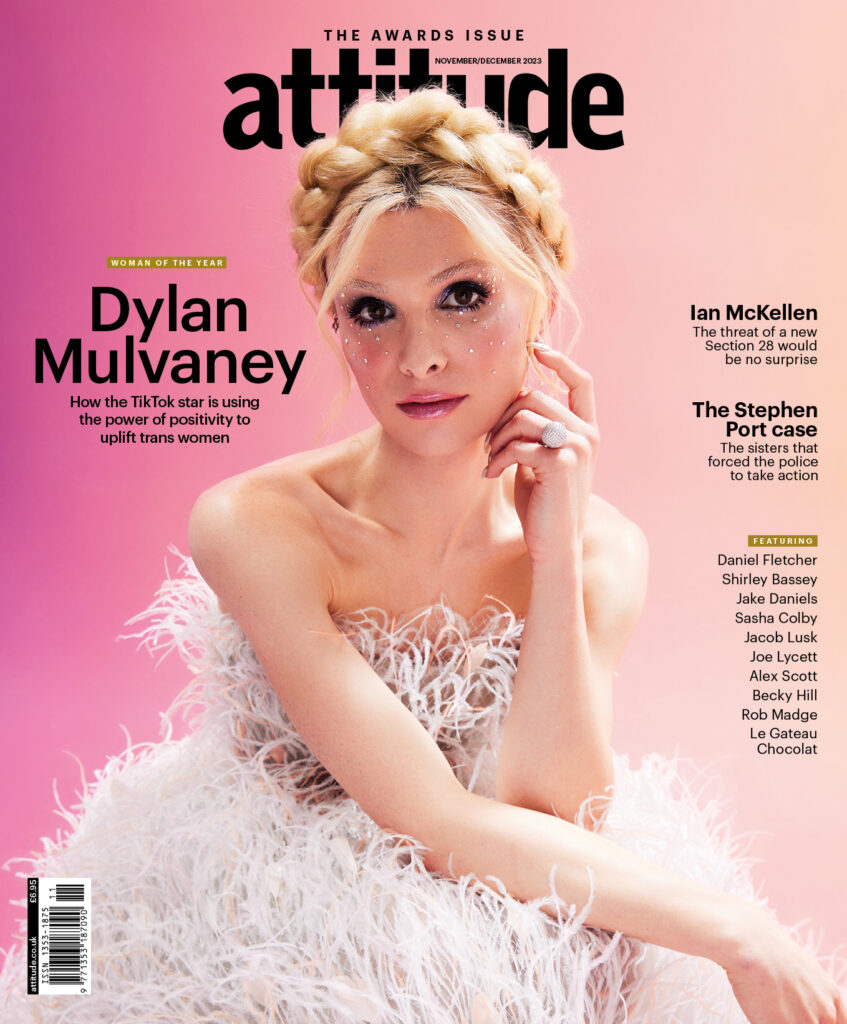Sasha Colby: ‘Trans people are the most powerful people there are’
The Drag Race winner is using her platform to spread a message of defiance - and fabulousity - amid dark times for the community. This is why she's the winner of the Drag Award at the 2023 Virgin Atlantic Attitude Awards, powered by Jaguar
By Dale Fox
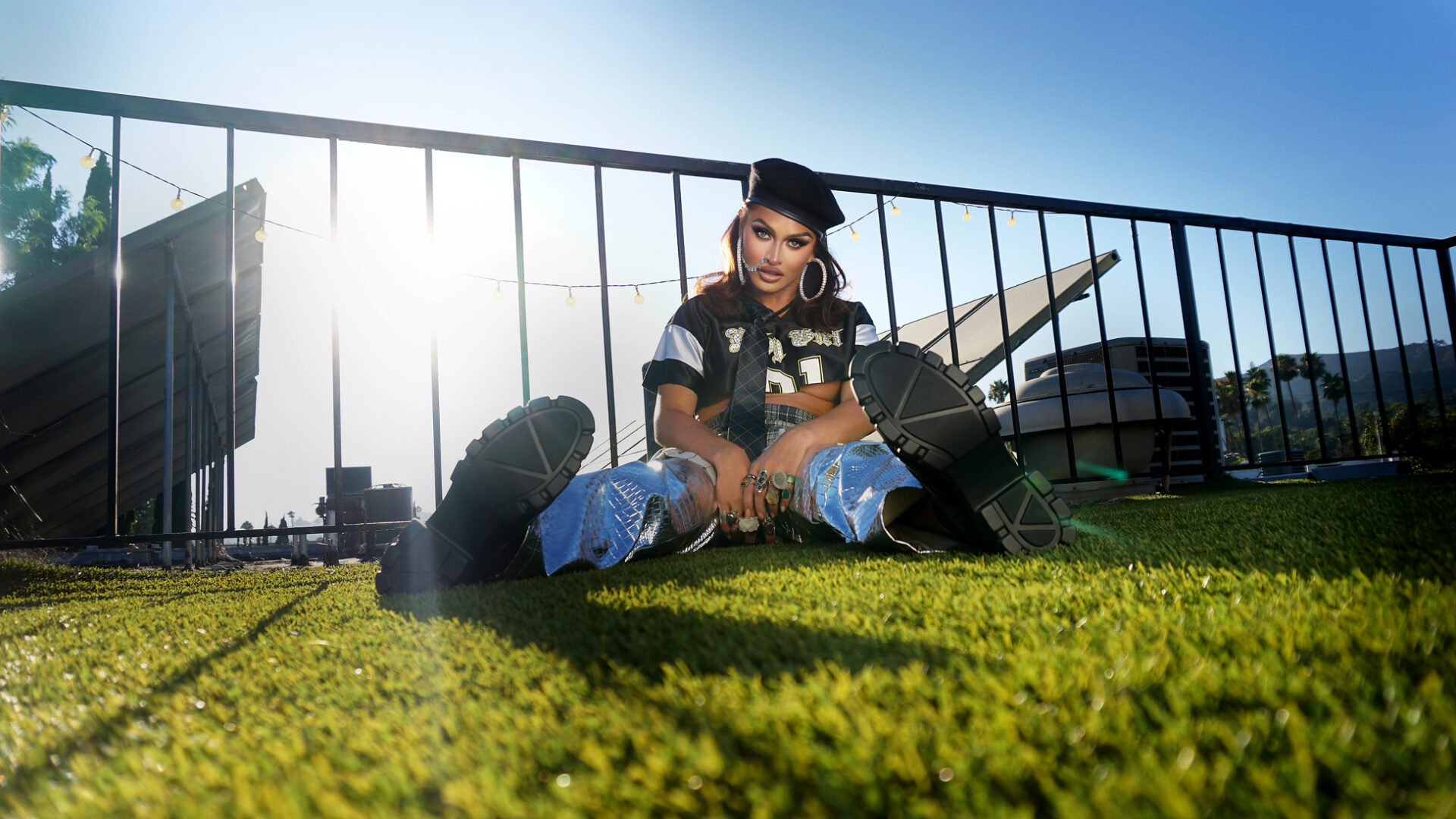
“My whole 20 years of drag, every time I got called a slur or was picked on as a queer kid, I was feeding that child; I was nurturing that child.”
I’ve just asked Sasha Colby – winner of the Drag Award at this year’s Virgin Atlantic Attitude Awards, powered by Jaguar – what was going through her mind during her now-legendary winning lip sync performance on the finale of RuPaul’s Drag Race season 15. At a time when real hatred against trans people and drag performers was — and still is — looming large in the US, her participation on the show as an out trans woman felt especially relevant.
“I knew that what I was doing was going to make history,” she says. “In that time of them enacting all those drag bans, all these trans bans, and wanting to eradicate us, that’s why I decided to strip down and protest.”
Strip down she did, revealing to the world layer by layer not only her dazzling, sequin clad body, but also a monumental message of defiance and selflessness for her community.
“It felt like I could be of more use by making it not about me and this accomplishment that I needed. I thought, ‘My performance and my mere existence are a fuck-you to these people who don’t even know us but want to kill us.’”
Throughout our conversation, it’s clear that Colby is motivated by a profound sense of altruism, taking on the role of a matriarch within the queer community who aims to make every marginalised member feel like they belong.
She doesn’t do what she does solely for the love of performing; she also yearns for everyone to find their place in the world. A brief look into her history makes it easy to understand where this motivation originates.
“I really just had the experience of an only child”
The 39-year-old Hawaii native was born into a staunchly religious Jehovah’s Witness family. Despite being the youngest of seven, she always “felt alone” as a child, in part due to the age gap between her and her siblings.
“My oldest brother and sister had three kids each by the time I was born. It was kind of hard to even relate to my older siblings. They were in their late twenties when I was born, so the connection with us wasn’t really there. I really just had the experience of an only child.”
Her queerness inevitably also played a role in this feeling of seclusion, since realising aged five that she was female. “I was definitely always very, very feminine,” she remembers. “I learned at an early age how to self-monitor very well, and that’s what I did. I was told constantly, ‘Stop walking like that. Put your hip in. Stop standing like that. Stop breaking your wrists.’ All these feminine things I naturally did, my parents reinforced that they couldn’t love me if I acted that way.”
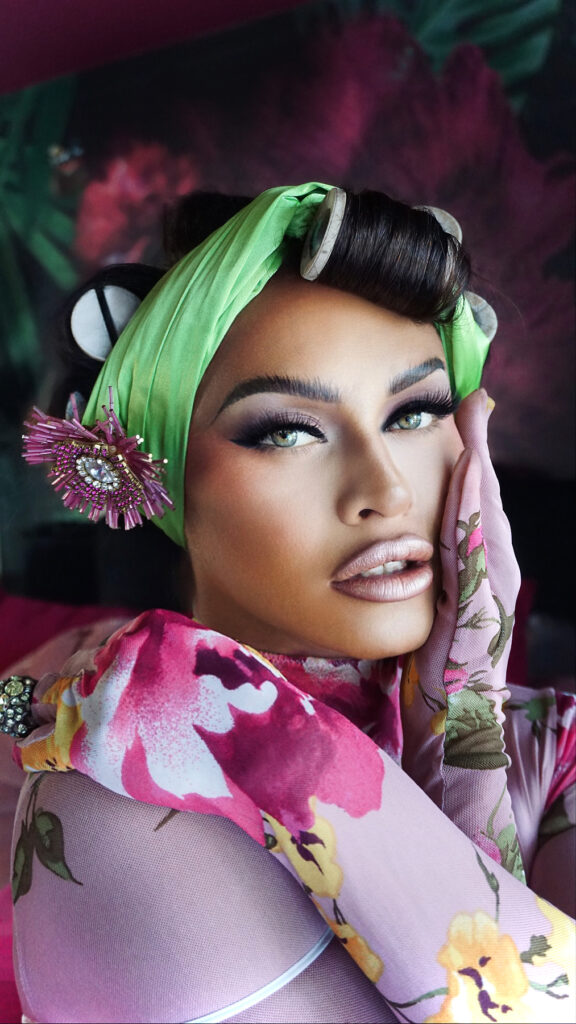
It was “really frustrating” for Colby’s parents to “not have control” over this aspect of her, with the star blaming the “cultish style” of their religion, as well as the pressures of tradition. To this day, Colby grapples with the habit of self-monitoring, although for different reasons.
“Now it’s like, ‘Make sure you’re acting feminine enough!’ It’s funny because everyone calls you a girl before you transition, but the second you present, everyone’s calling you a man.”
To the casual fan of US drag, Colby’s formidable entrance into the Werk Room may not have had the same impact without the stunned reactions of her fellow contestants. “Is that Sasha Colby?” exclaimed a gobsmacked Anetra upon Colby’s arrival, signalling that Ms Colby was not just another queen joining the show, but a bona fide legend within both the drag and trans communities.
“I’d sneak into clubs at 17 and watch the drag shows”
“I did my first drag number on my 18th birthday. I’d sneak into clubs at 17 and watch the drag shows and as soon as I was legal, I was like, ‘Can I perform?’. I never really looked back after that,” recalls Colby. “I was already a dancer, then I saw this performance style called drag, which I gravitated to because of the transness.”
It was around this time that Colby met her drag mother and namesake, Cassandra Colby, who “was really the first example of a beautiful, self-sufficient trans woman” she’d seen. “She had a job, she had a car, she had someone who loved her. She had the human experience, without it having to be about gender or identity.” Meeting Cassandra and other “really exciting trans women” was “when I realised I had to transition, knowing that there was a safe space to be”.
That encounter would signal the beginning of Colby’s ascension to the heady heights of the drag world. Not only would she regularly slay the house down in bars and clubs across the US, but she also became a fixture on the ever popular drag pageant scene, taking home the coveted Miss Continental crown in 2012 on her third attempt at the competition, and moving to LA around the same time.
Though mainly known for dazzling pageant glamour, Colby’s drag style has evolved enormously over her two decades of performing. In 2018, she became a regular in Sasha Velour’s acclaimed NightGowns revue, stunning on stages across the country in typical avant-garde Velour style, showing her versatility as a queen who really can do it all.
“Doing it all just felt right”
I ask Colby whether it ever confuses people to see a trans woman as a drag performer, and she responds by saying her two identities as a trans woman and a drag queen are deeply intertwined. “There was always this question of ‘Do I do drag and be trans or do I just transition and get my sex change?’ — that’s usually the two options you have as a trans woman. But to me, doing it all just felt right, and I really had to educate a lot of people in LA about it.
“When I moved to LA 10 years ago, there were maybe two or three trans drag performers — it was literally me, Sonique [Kylie Sonique Love, winner of All Stars 6] and Fontasia L’amour who were trans and working drag queens.”
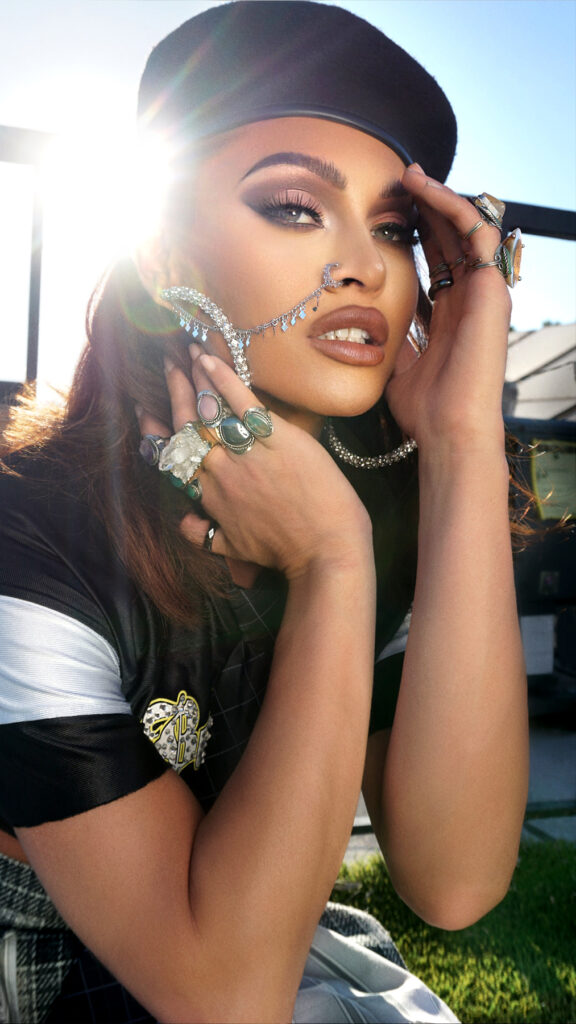
It was within the queer community that Colby found the familial support she never had growing up, explaining that contact was cut with her parents and all but one of her relatives years ago. Her father died by suicide in 2016.
“I don’t talk to any of my family, except for one niece who I raised. She’s my sister’s daughter, and I raised her since I was, like, 10. My sister battled drug addiction and mental illness and couldn’t take care of her daughter, so I did.”
“My brothers and sisters will still misgender me and deadname me”
Even 20 years after transitioning and becoming one of the most respected in her field — she is now a household name — Colby explains how she still isn’t recognised by her biological family as who she is. “I’m 39 years old, and my brothers and sisters will still misgender me and deadname me to this day. Sasha Colby is degraded by her own family,” she says.
Despite her fierce outward persona, the hurt is apparent in her voice as she tells me this. But, rightly so, she frames her family’s rejection as having made her stronger and credits her recognition as a drag superstar for providing the validation she never got at home.
“The second I created healthy boundaries and cut ties, I got the biggest blessing of my life, which is Drag Race. And it’s just for me. They don’t get any of it.” Her words resonate with the resilience and defiance that have emanated from her since her teenage years when she explored the clubs and bars of Hawaii as she found herself, defying her parents’ expectations as to how she should behave.
“With all their self monitoring and telling me not to, I did it even more. I got tits, I wore bikinis, I shoved it in their faces.”
“RuPaul’s Drag Race is probably one of the only outlets of media that celebrates the trans experience”
Though RuPaul himself answered “probably not” when asked if his show would accept transgender contestants who had fully transitioned in a 2018 interview, he made a U-turn shortly afterwards following a backlash, saying: “The trans community are heroes of our shared LGBTQ movement. You are my teachers.”
This marked a turning point that saw a number of trans queens appear on the show — including Colby’s own drag daughter, Kerri Colby, who competed a year before Colby and came ninth. It was at this point that Colby decided to finally throw her hat into the ring — not just for recognition, but also to make a stand during one of the darkest periods for trans people and drag performers in America, amid political backlashes.
“RuPaul’s Drag Race is probably one of the only outlets of media that celebrates the trans experience instead of talking about the trauma of being trans,” Colby explains. “Everything else is about the transition and what it meant to our family and what it means to society, but they never talk about why we transition, why we go through all of this, why we ostracise ourselves from m our family, our friends.”
She adds: “It was the first time I was never silenced as a trans woman of colour. I was allowed to say my story in front of the world — that was so amazing to me.”
“It feels like the love I never got from my family”
When I ask Colby what winning the Drag Award means to her, she chokes up, reflecting on the journey that’s brought her to where she is today — on top of the world and living as her authentic self, despite missing the one thing that so many of us take for granted.
“It feels like the love I never got from my family,” she answers, tearfully. “I’m in awe that I’m just doing me and it’s resonating with so many people. I can’t believe that little me and life is being honoured.”
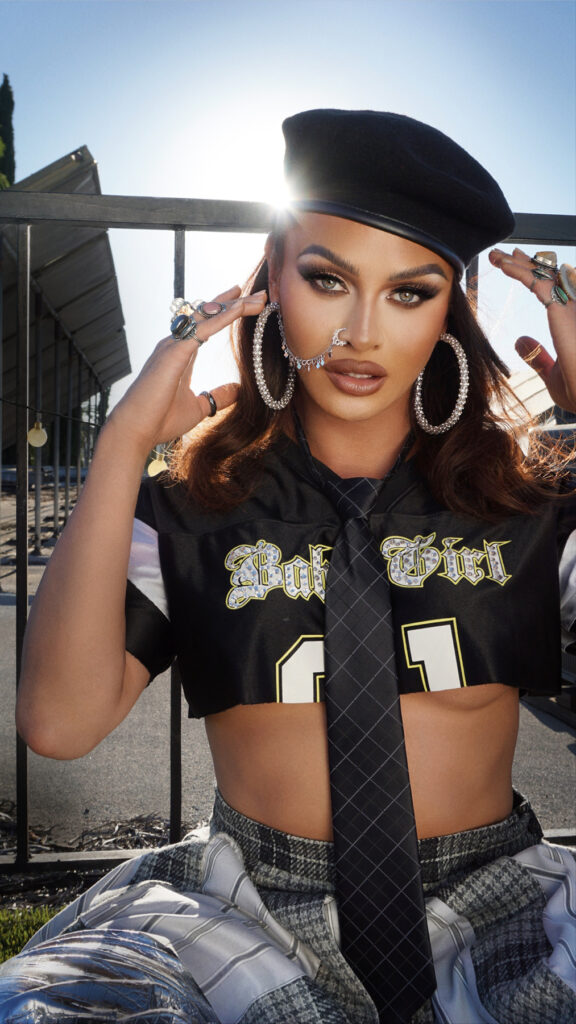
She recounts trans fans telling her how she helped their parents and grandparents accept them — a role she embraces wholeheartedly. “I never got love from my family, so I’m a mother to so many. Every kid I ‘adopt’ is one I see a broken part in. I want to nurture that child.”
As Colby reflects more on the prejudice trans people face, her words grow increasingly impassioned. “Trans people are the most powerful people there are. Imagine just wanting to express yourself even though you might get killed. It has to be something so powerful in you that you’re willing to go through a lot just to find happiness.”
“My fierceness on stage allows me to have a platform to empower everyone”
On the wave of transphobia that seems to have been dominating the mediascape for the last several years, Colby’s message is simple: she believes transphobes resent the confidence of those who live as their true selves.
“You hate that we live authentically while you have to lie. The audacity of us being free makes you willing to kill us. A lot of men who go with trans women are the ones living the white picket fence life with the wife and kids and dog, because they’re told to.
“Those ones who clock our tea in the street and shout, ‘That’s a man!’ are always the first ones standing in line for the buffet.”
What does the future hold for Sasha Colby following her Attitude Award win? More ferocity, more hair flips, and more spreading love to the masses as she begins her first UK tour. But most importantly, she wants to pass her indomitable strength on to others through everything she does.
“Whether you watch a show of mine or you get to interact with me, I want you to feel empowered in your everyday life. My fierceness on stage allows me to have a platform to empower everyone — that’s my motive in life.”
Words Dale Fox Hair, makeup and photography Preston Meneses Styling Laurel Thomson
The Attitude Awards issue is out now.
